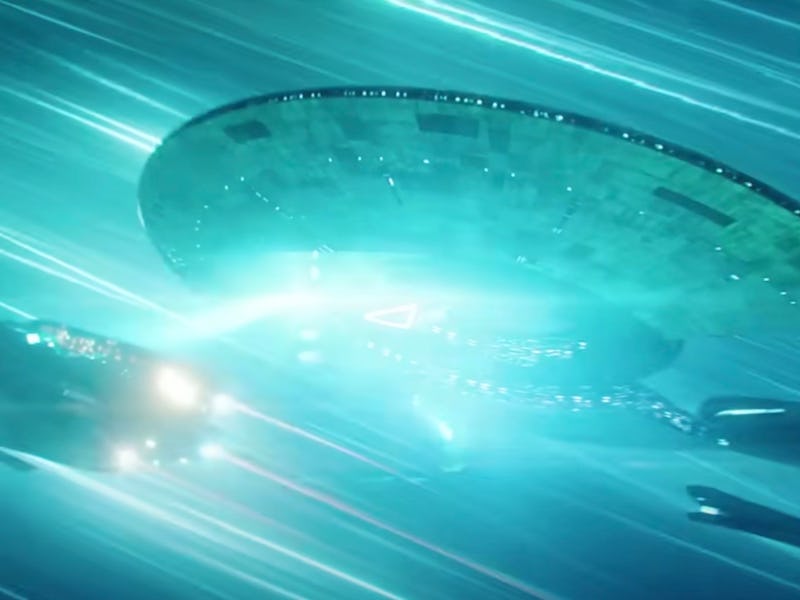59 Years Later, Star Trek Just Proved It Still Needs Its Oldest Sci-Fi Plot Device
Trek just can’t quit the warp drive, even in the 32nd Century.

After almost six decades and hundreds of years of future history, the fastest way to travel in the final frontier is still by firing up your faithful warp drive. Star Trek’s famous faster-than-light tech was originally conceived as a “time warp” drive in the 1964 pilot “The Cage,” but was later changed to just a “warp” drive to avoid confusion. But why is this concept still around? Surely people living in the 25th and 32nd centuries have come up with something a bit faster? In a new clip from Discovery Season 5, a piece of dialogue reminds us why warp drive is still such a big deal, even 900 years after the era of Captain Kirk.
Although the plot of Discovery Season 5 is still vague, we do know it will involve a galaxy-wide treasure hunt that will see our Starfleet heroes compete against thieves named Moll (Eve Harlow) and L’ak (Elias Toufexis). In an extended preview revealed at San Diego Comic-Con, we find Captain Burnham (Sonequa Martin-Green) chasing them and jumping on their ship as it goes into warp. As Burnham hangs out inside their warp bubble and tries to disable their engines, another Starfleet ship arrives: the USS Antares, commanded by Captain Rayner, a new character played by Callum Keith Rennie.
Some brief technobabble ensues, in which Burnham realizes that if the Antares keeps their tractor beam on the escaping enemy ship, its warp bubble will collapse and she’ll be crushed. Why can’t the Antares just pull this smaller ship out of warp? Burnham raises this same question, saying, “reverse engines and pull them out of warp.” But Rayner can’t, and it’s all connected to the type of FTL drive his ship is using.
“If I had a Pathway Drive, maybe,” Rayner says. “But we’re still making do with Burn tech out here.”
By “Burn tech,” Rayner means old-school warp drive. The “Pathway Drive” is an experimental propulsion system Starfleet was working on during Season 4 of Discovery. So although the ships in the 32nd Century of Discovery look slicker, they’re running off the same FTL drives that Pike, Kirk, Sisko, and Picard deal with in the 23rd, 24th, and 25th centuries.
Why does this matter? Well, Discovery Season 3 posits that a catastrophe called “the Burn” put the entire galaxy’s ability to develop new technology back roughly 120 years. The Burn also made dilithium, the crystal crucial to stabilizing warp fields, even rarer than it already is. Dilithium also caused the Burn, which is like saying Star Trek’s reliance on warp drive caused Star Trek to become reliant on warp drive.
Star Trek’s alternate warp drives
The Enterprise-D going waaaaay too fast.
Discovery has been trying to make other forms of space propulsion happen since Season 1. The obvious example is the USS Discovery’s Spore Drive, which uses the Mycelial network to instantly transport the ship. But it’s way more complicated and can only be operated by specialists like Paul Stamets (Anthony Rapp). The Spore Drive isn’t sustainable, just like Star Trek’s other alternate drives.
In Star Trek III: The Search for Spock, the USS Excelsior had something called a Transwarp Drive. This was mostly a punchline, and Scotty was easily able to sabotage it. The Excelsior is still around in Star Trek VI, but had been refitted with a regular old warp drive. In The Next Generation’s “Where No One Has Gone Before,” Kosinski and the Traveler attempt to introduce a thought-based form of propulsion that goes horribly awry, and in “Remember Me” Wesley traps his mom, Dr. Crusher, in an alternate dimension when he tries to create a new kind of warp bubble. And, of course, in the Voyager episode “Threshold,” crossing the Warp 10 barrier turns Janeway and Tom Paris into salamanders.
You get it. Anything that’s not warp drive, in the Star Trek canon, is unpredictable and dangerous. And yet, now that Trek canon has pushed several centuries beyond its original timeline, it seems likely that at some point warp drive will have to become obsolete. Back when The Next Generation was in early development, Roddenberry and other producers briefly floated the idea that in the distant future transporters will be so powerful that Starfleet wouldn’t even need ships. So, if Trek ever does get rid of warp drive, they can just beam people around.